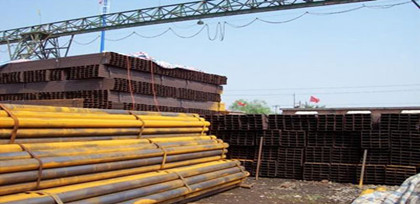Chemical News
-
Steel mills backed by falling iron ore prices
http://www.chemnet.com Apr 28,2015 Global Times

Even as China's domestic steel demand shrinks and the industry battles chronic overcapacity, lower iron ore prices have helped many large mills post better earnings for 2014 than a year earlier, supported by record exports.
That doesn't bode well for struggling steel makers elsewhere in the world, which have been hoping for a shake-out of the industry in China, the world's top steel producer.
"[Cheaper ore] obviously encourages Chinese steel makers to still produce because their costs are lower, and because of the overcapacity there's a strong incentive to still export," said Jeremy Platt, an analyst at London-based steel consultancy MEPS.
China boosted exports of the alloy by some 50 percent last year to a record 94 million tons, and Western industry bodies see little sign of a major rationalization of the industry.
According to the latest batch of Chinese steel earnings, only three of 18 big mills that have reported annual results so far suffered losses in 2014, down from five in 2013. Six of the 13 profit-making mills in 2013 increased their profits in 2014.
"Big Chinese integrated coastal mills are among the most competitive in the world as they have benefited the most from sharp falls in imported iron ore prices, helping them to gain growing market share both at home and abroad," said Zhao Chaoyue, a steel analyst with Guangzhou-based Merchant Futures.
Seaborne iron ore prices tumbled 50 percent over the course of 2014 amid a push by mega iron ore miners to ramp up supply and win market share.
Big Chinese mills are able to ship in cheaper seaborne ore direct to their coastal steel-making operations, selling to customers nearby or shipping steel overseas.
The iron ore price fall also encouraged large mills - those with an annual output of more than 10 million tons - to buy more from the spot market, winning benefits once garnered mainly by more flexible private mills.
Despite the scrapping of tax rebates for exports containing boron that had helped to boost sales, Chinese exports rose 41 percent in the first quarter, increasing concerns from rival producers around the world.
South Korea's POSCO, the world's sixth-biggest steel maker, said on Tuesday it expected growing pressure from exports from China and Russia, which would hurt prices.
The EU is imposing anti-dumping duties on imports of cold-rolled flat stainless steel from the Chinese mainland and Taiwan. India's trade ministry has also recommended anti-dumping duties against China, Malaysia and South Korea for some industrial grade steel imports.
China aims to cut the number of its steel mills by more than 40 percent to below 300 by 2017, and plans to have three to five giant steel players by 2025. It wants the top 10 mills to account for 60 percent of output.
 Print |
Print |  add to Favorites |
add to Favorites |  Close
Close


